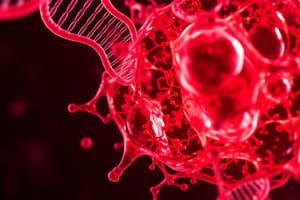Podcast
Questions and Answers
What organelle is responsible for the synthesis of ribosomes?
What organelle is responsible for the synthesis of ribosomes?
- Mitochondria
- Endoplasmic reticulum
- Golgi apparatus
- Nucleolus (correct)
In which type of solution does fluid flow out of the cell?
In which type of solution does fluid flow out of the cell?
- Hypertonic (correct)
- Isotonic
- Hyperosmotic
- Hypotonic
Which process involves the movement of large materials through the cell membrane?
Which process involves the movement of large materials through the cell membrane?
- Exocytosis (correct)
- Passive transport
- Facilitated diffusion
- Facilitated transport
What type of transportation across a differentially permeable membrane requires no metabolic energy?
What type of transportation across a differentially permeable membrane requires no metabolic energy?
What is the function of peroxisomes in a cell?
What is the function of peroxisomes in a cell?
What is the composition of chromatin?
What is the composition of chromatin?
What is the main function of cilia in a cell?
What is the main function of cilia in a cell?
What is the role of nucleoplasm in the nucleus?
What is the role of nucleoplasm in the nucleus?
What is the process that involves the movement of molecules from a region of lower concentration to a region of higher concentration, against a gradient or an obstacle with the use of external energy?
What is the process that involves the movement of molecules from a region of lower concentration to a region of higher concentration, against a gradient or an obstacle with the use of external energy?
Which form of diffusion requires the assistance of membrane proteins?
Which form of diffusion requires the assistance of membrane proteins?
What is the term for the process where the cell discharges material out of the cell?
What is the term for the process where the cell discharges material out of the cell?
Which type of endocytosis is more specific and involves the uptake of specific molecules bound to receptor proteins?
Which type of endocytosis is more specific and involves the uptake of specific molecules bound to receptor proteins?
Flashcards are hidden until you start studying
Study Notes
Cellular Organelles and Functions
- The synthesis of ribosomes occurs in the nucleolus.
Cell Membrane Transport
- Hypotonic solution: fluid flows out of the cell.
- Active transport: movement of large materials through the cell membrane, requiring metabolic energy.
- Passive transport: type of transportation across a differentially permeable membrane that requires no metabolic energy.
- Facilitated diffusion: type of diffusion that requires the assistance of membrane proteins.
Cellular Components and Functions
- Peroxisomes: involved in the breakdown of fatty acids and amino acids.
- Chromatin: composed of DNA and proteins (histones) in the nucleus.
- Cilia: responsible for movement and sensing the environment.
- Nucleoplasm: a gel-like substance in the nucleus where DNA replication and transcription occur.
Cellular Processes
- Active transport: the process that involves the movement of molecules from a region of lower concentration to a region of higher concentration, against a gradient or an obstacle with the use of external energy.
- Exocytosis: the process where the cell discharges material out of the cell.
- Receptor-mediated endocytosis: a type of endocytosis that is more specific and involves the uptake of specific molecules bound to receptor proteins.
Studying That Suits You
Use AI to generate personalized quizzes and flashcards to suit your learning preferences.




